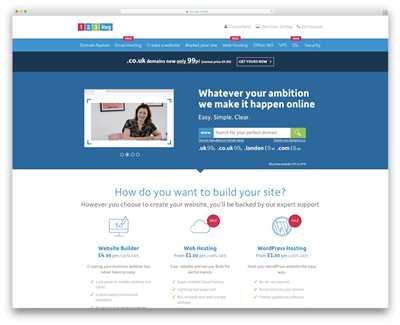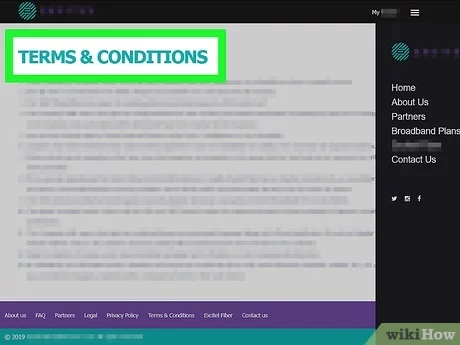
If you’re looking to offer the world your own personal website, it’s important to choose a hosting provider that makes the process easy and accessible. With so many options out there, it’s important to find the best one that suits your needs.
One of the most reliable hosting providers out there is Bluehost. They offer 24/7 customer support, cPanel for easy management, and reliable servers for fast loading times. They also provide scalability, so you can easily upgrade your hosting plan as your website grows.
When choosing a hosting provider, it’s important to look for one that offers protection measures against technical issues and cyber attacks. Bluehost, for example, has built-in protection measures to keep your website safe and secure.
Once you’ve chosen a hosting provider, the next step is to take care of the technical side. You’ll need to register a domain name and install the necessary software to host your website. Most hosting providers offer a one-click installation for popular website platforms like WordPress.
After you’ve completed the installation process, it’s time to start building your website. You can choose from a wide range of templates and customize them to fit your needs. Make sure to include all the necessary pages, such as an about page, a contact page, and a portfolio if needed.
While building your website, it’s important to keep in mind that performance is key. Make sure to optimize your website for fast loading times and make it accessible to search engines like Google. This will help improve your website’s visibility and attract more visitors.
Finally, once your website is up and running, don’t forget to regularly update your content and make necessary backups. This will ensure that your website stays fresh and secure, and it will give your visitors a reason to keep coming back.
In conclusion, hosting your own personal website can be a rewarding experience. By following these tips and choosing a reliable hosting provider like Bluehost or Hostinger, you can create a website that is both user-friendly and visually appealing. So go ahead and get started on your personal website journey today!
- How to Host a Website for Beginners Locally and/or Publicly
- 4 common types of web hosting
- 1 Shared hosting
- 2 Virtual Private Server hosting (VPS)
- 3 Dedicated hosting
- 4 Cloud hosting
- Tips for Choosing a Web Host
- Look for Reliable Performance
- Pay Attention to the Security Measures
- Check for Comprehensive Features
- Assess the User Experience
- Find the Best Value for Money
- Look for 24/7 Customer Support
- Ensure the Web Host’s Scalability
- Get your website on the internet
- Video:
- How To Host Your Own Website For FREE – Home Server Tutorial
How to Host a Website for Beginners Locally and/or Publicly
When it comes to hosting a website, having control over your hosting environment is a crucial aspect, especially for beginners. Hostinger provides a comprehensive range of hosting services that will suit both personal and business needs. Whether you want to host your website locally or publicly, Hostinger has got you covered.
There are several types of hosting options available, such as shared hosting, virtual private server (VPS) hosting, and dedicated hosting. For personal websites and small businesses, shared hosting is a good choice as it offers a lower cost and provides a shared environment for multiple sites. On the other hand, VPS hosting provides a virtual private space that ensures better performance and allows for more control.
If you’re a beginner and looking for a hosting provider, Hostinger is a great option. They offer 24/7 customer support and have a user-friendly control panel, cPanel, which makes managing your hosted files and domains a handy experience.
One of the advantages of hosting with Hostinger is the inclusion of a free SSL certificate, which provides security and protection for your website. This is especially important for businesses that deal with online transactions or handle sensitive customer information.
Hostinger’s hosting plans are value-packed and accessible to anyone with an internet connection. Their performance is generally excellent, with website loading times measured in milliseconds. This is a result of their efficient network communication and the use of state-of-the-art server hardware.
If you already have a website hosted elsewhere and want to migrate to Hostinger, they offer a convenient migration service that takes care of transferring your files, databases, and other resources to their servers. This ensures a seamless transition and minimizes any downtime for your website.
Whether you choose to host your website locally or publicly, Hostinger provides the necessary support and features to ensure a smooth hosting experience. Their hosting services are reliable, cost-effective, and tailored to suit the needs of beginners and experienced website owners alike.
So, if you’re looking for a hosting provider with excellent performance, reliable support, and comprehensive hosting plans, Hostinger is the way to go.
- Control over hosting environment
- Comprehensive range of hosting services
- Good value for money
- User-friendly cPanel control panel
- 24/7 customer support
- Included SSL certificate for security
- Fast website loading times
- Convenient migration service
- Reliable and cost-effective hosting
4 common types of web hosting
When it comes to hosting your personal website, there are several types of web hosting services to choose from. Each type has its own set of features and benefits, making it essential to understand the different options available. Below, we will discuss the 4 most common types of web hosting:
- Shared Hosting: This is the most common type of web hosting, generally used by small websites with low to medium traffic. In shared hosting, multiple websites share resources on a single server, making it a cost-effective option. However, it can lead to slower loading times and limited control over server settings.
- VPS Hosting: VPS (Virtual Private Server) hosting is a step up from shared hosting. It provides more reliable and scalable hosting options, especially for websites that require more resources and higher performance. With VPS hosting, you get a private section of a server with its own set of resources and allocated server space.
- Dedicated Hosting: Dedicated hosting offers a large amount of server resources and complete control over your hosting environment. It is particularly useful for large websites or those with high traffic volume. With dedicated hosting, you have the entire server at your disposal and can tailor it to your specific needs.
- Cloud Hosting: Cloud hosting is a flexible and scalable hosting solution that allows multiple servers to work together. It ensures high availability and provides excellent performance even during traffic spikes. Cloud hosting also offers handy features such as easy scalability, pay-as-you-go pricing, and improved security measures.
These are the four most common types of web hosting. Each type has its own advantages and disadvantages, so it’s important to choose the one that best fits your website’s needs. Consider factors like budget, scalability, performance, security, and technical expertise when selecting a hosting provider. With careful attention to these factors, you can find a web hosting service that offers good value and meets your specific requirements.
1 Shared hosting
Shared hosting is the most common and affordable type of hosting that is suitable for beginners and personal websites. With shared hosting, multiple websites are hosted on a single server, which helps to lower the hosting expenses. This makes it a good option for those who are just starting out or have a limited budget.
When you use shared hosting, you will have access to a shared server, meaning that your website files will be stored on the same server as other websites. This also means that your website will be publicly accessible, so it is important to take measures to ensure the security of your website.
Some popular shared hosting providers are Bluehost, Hostinger, and GoDaddy. These hosts offer comprehensive plans and features that are useful for managing a personal website. Bluehost, for example, provides a free domain name for the first year and offers a 30-day money-back guarantee.
Shared hosting is especially beneficial for websites with low to moderate traffic. However, if your website experiences spikes in traffic or if you have more intensive hosting needs, you may need to consider other hosting options such as VPS or dedicated servers.
When choosing a shared hosting service, it is important to consider the technical support and customer service that the host provides. You want to ensure that you have access to 24/7 support and that they have measures in place to ensure the security and uptime of your website.
Shared hosting is a cost-effective option for hosting a personal website. Plans can start as low as a few dollars per month. It is important to check the rates and features of different hosting providers to find the best option for your needs.
2 Virtual Private Server hosting (VPS)
When it comes to hosting a personal website, most website owners look for a hosting solution that provides better performance and more control over their website. Virtual Private Server (VPS) hosting is one such option that can help website owners achieve their goals.
VPS hosting is a type of hosting that allows website owners to have their own private server, similar to dedicated hosting, but at a more affordable price. With VPS hosting, multiple websites are hosted on a single physical server, but each website has its own private and isolated virtual server environment.
One of the main benefits of VPS hosting is the ability to manage high levels of traffic and spikes in traffic without affecting the performance of other websites on the server. This makes it an ideal hosting option for websites with large amounts of traffic or websites that need better performance.
With VPS hosting, you get access to more resources (RAM, CPU, disk space) compared to shared hosting, which results in better website performance. Additionally, VPS hosting providers usually offer better technical support and uptime rates compared to shared hosting providers.
In order to use VPS hosting, website owners should have some technical knowledge or be willing to learn. Although VPS hosting providers usually offer a control panel to manage the server, there is still a learning curve to set up and manage the server processes.
Here are some tips for choosing a good VPS hosting provider:
- Start with a reliable hosting provider that has a good track record and has been in the business for a while. Some popular VPS hosting providers include Hostinger, Bluehost, and DigitalOcean.
- Look for a VPS hosting plan that meets your website’s needs. Consider factors such as storage, bandwidth, and RAM.
- Check if the hosting provider offers value-added features such as SSL certificate, staging environment, and website backups.
- Consider the level of control you will have over your server. Some VPS hosting plans provide full root access, allowing you to have complete control over your server.
- Read customer reviews to get an idea of the hosting provider’s performance and customer support.
- Compare pricing plans and choose the one that offers the best value for your money.
- Understand the difference between managed and unmanaged VPS hosting. Managed VPS hosting requires less technical expertise as the hosting provider takes care of server management tasks, while unmanaged VPS hosting gives you more control but requires more technical knowledge.
In conclusion, VPS hosting is a great option for website owners who require better performance, control, and reliability. It allows you to host your personal website without any loading or accessibility issues, and it can handle large amounts of traffic without affecting the performance of other websites. By following the tips mentioned above, you can find a reliable VPS hosting provider that meets your website’s needs.
3 Dedicated hosting
When it comes to hosting your personal website, dedicated hosting is a great option for those looking for more control and higher performance. With dedicated hosting, you will have your own server that is exclusively used to host your website. This means that you won’t be sharing server resources with other websites, which can often lead to better loading speeds and overall performance.
One of the key advantages of dedicated hosting is the level of support it provides. Most dedicated hosting providers offer technical support to help you manage your server and resolve any issues that may arise. This can be especially useful if you don’t have much experience with server management or if you run into any technical difficulties.
Another important factor to consider is the security of your website. Dedicated hosting often includes robust security measures to protect your website from malware and other threats. This can help ensure that your website stays safe and accessible to your visitors.
Choosing a dedicated hosting provider can be a daunting process, but there are several reputable companies that offer dedicated hosting services. Bluehost, for example, is a popular provider that offers reliable dedicated hosting plans at affordable rates. They also provide features like staging environments, weekly updates, and easy access to server files.
In addition to Bluehost, you can also consider other providers like Hostinger, Amazon Web Services, and Google Cloud. These providers offer a variety of dedicated hosting plans with different features and pricing options to cater to your specific needs.
However, it’s important to note that dedicated hosting can be more expensive compared to shared hosting. This is because you are paying for the resources of an entire server for your website alone. The cost of dedicated hosting can vary depending on the provider you choose and the specifications of the server you require.
In conclusion, dedicated hosting is a good option for personal websites that require higher performance, more control, and better security. By choosing the right dedicated hosting provider and plan, you can ensure that your website has the necessary resources and support to grow and thrive on the internet.
4 Cloud hosting
When it comes to hosting a personal website, using cloud hosting can be a great option. Cloud hosting allows you to host your website on a private network of servers, which provides several benefits for your personal site.
One of the main advantages of cloud hosting is that it requires no physical server on your end. Instead, your website is hosted on virtual servers that are managed by a cloud hosting provider. This eliminates the need for you to purchase and manage your own server, which can save you both time and expenses.
In order to get your personal site up and loading quickly, cloud hosting provides the following features:
- A comprehensive network of servers: Cloud hosting providers have multiple servers in different locations, allowing your website to load quickly no matter where your visitors are located.
- Scalability: If your website experiences growth or spikes in traffic, cloud hosting can easily handle the increase in demand. The provider can allocate more resources to your website to ensure it continues to function smoothly.
- Lower costs: Cloud hosting providers offer different pricing options, making it suitable for small businesses or individuals with a limited budget. You only pay for the resources you need.
- Security: Cloud hosting providers have special security measures in place to protect your website from cyber threats. They offer regular backups and updates, ensuring that your website is safe and secure.
When choosing a cloud hosting provider for your personal website, there are a few things you should consider:
- Assess your needs: Determine the amount of storage space, bandwidth, and processing power you require for your website.
- Check for uptime guarantees: A reputable cloud hosting provider should offer a high uptime guarantee, ensuring that your website is accessible to visitors.
- Look at the available features: Consider the features and software platforms that are important for your website, such as pre-installed software or special communication tools.
- Consider security: Choose a cloud hosting provider that offers robust security measures, including firewalls, encryption, and regular security audits.
Cloud hosting is a popular choice among website owners due to its flexibility, scalability, and cost-effectiveness. By using cloud hosting for your personal website, you can ensure that your site is always accessible and provides a great experience for your visitors.
Tips for Choosing a Web Host
When it comes to hosting a personal website, there are several important factors to consider when choosing a web host. Following are some useful tips to help you make an informed decision:
- Assess your needs: Before choosing a web host, you should assess your website’s requirements. Determine the amount of space you’ll need, how many websites you plan to host, and any special software or communication protocols you will be using.
- Look for scalability: It’s important to choose a web host that can accommodate your website’s potential growth. Ensure that the hosting plans offered by the company can easily scale up as your website expands.
- Consider customer support: Quality customer support is essential for a smooth hosting experience. Look for web hosts that provide 24/7 customer support via email, live chat, or phone. This is especially important if you are new to hosting and may need assistance.
- Check for reliability: The uptime score of a web host is crucial. Look for providers that guarantee a high uptime percentage, ideally 99.9% or higher. This ensures that your website will be accessible to users at all times.
- Pay attention to server speed: Slow loading times can result in a poor user experience and lower search engine rankings. Make sure the web host you choose has fast servers that respond in milliseconds.
- Consider security and protection: Protecting your website from malware and other internet threats is essential. Look for web hosts that offer comprehensive security measures such as SSL certificates, regular backups, and malware scanning.
- Check the migration process: If you already have a website hosted elsewhere, check if the web host offers an easy migration process. This will help you transfer your files and databases smoothly to the new host without any data loss.
- Consider your budget: Hosting costs can vary greatly. Determine how much you are willing to pay for hosting and compare plans from different providers. Remember to consider the features and resources included in the package to get the best value for your money.
- Look for user-friendly interfaces: A good web host should provide a user-friendly control panel, such as cPanel, that allows you to manage your website easily. This will help you make changes to your website design, create email accounts, and access other important functionalities.
- Read reviews and testimonials: Researching and reading reviews from other customers can give you insights into the experiences of real users. Look for web hosts that have positive reviews and a good reputation in the industry.
By following these tips, you can select an excellent web host that meets your specific needs and provides you with reliable hosting services.
Hostinger is a web host that offers a variety of hosting plans suitable for small and large websites. With their comprehensive security measures, 24/7 customer support, and user-friendly interfaces, Hostinger can help ensure a smooth hosting experience. Visit Hostinger to find out more.
Look for Reliable Performance

When hosting a personal website on the internet, you want to make sure that it offers reliable performance. Paying for hosting expenses is necessary, but you also want to have control over your website’s performance. A large cyber presence means more traffic and more potential customers or readers. Therefore, it is essential to look for a hosting provider that offers excellent performance.
One way to ensure excellent performance is by choosing a hosting provider that offers dedicated hosting plans. With dedicated hosting, you have a server all to yourself, which means you don’t have to share resources with other website owners. This provides better control over your website’s performance and allows for higher levels of traffic without compromising speed or stability.
If you are on a budget, shared hosting is a more affordable option. With shared hosting, you share a server with other website owners. Although it may not provide the same performance as dedicated hosting, it still offers a reliable option for small businesses or personal websites. Shared hosting plans are usually more budget-friendly, making them an excellent choice for those just starting.
Another important aspect to consider is the hosting provider’s customer support. Look for a provider that offers 24/7 support, so you can get assistance whenever needed. This is especially important if you are new to hosting and may need help setting up or troubleshooting technical issues.
Furthermore, check if the hosting provider offers regular updates and security protection. This ensures that your website is always up to date and protected from cyber threats. Look for providers that have SSL certificates pre-installed, as this adds an extra layer of security to your website. SSL certificates are handy if your website involves transactions or collects personal information from your users.
When choosing a hosting provider, it’s always a good idea to check their performance value. Some providers publicly display their performance metrics, such as uptime and load time. These metrics give you an idea of how reliable their servers are and how well they can handle high traffic. Look for providers with excellent performance records, as this indicates a more reliable hosting experience for your website.
Hosting providers that offer scalability are also valuable, especially for websites with potential growth. Scalable hosting plans allow you to easily upgrade your hosting resources as your website’s needs increase. This prevents any site crashes or slowdowns caused by sudden traffic surges. A hosting provider that offers different types of plans, such as shared, virtual private server (VPS), and dedicated, provides more options for scalability.
In conclusion, when hosting a personal website, look for a reliable hosting provider that offers excellent performance, regular updates, security protection, and 24/7 customer support. Consider your budget and scalability needs when choosing a hosting plan. Checking the hosting provider’s performance metrics publicly available can also be handy to ensure a better hosting experience.
Pay Attention to the Security Measures
When hosting your personal website, it’s important to pay attention to the security measures in place. Your website features valuable content or personal information, therefore it’s crucial to implement some security measures to keep it safe.
One of the first things you should do is go through the options and features offered by your hosting service provider. There are some plugins and tools available that can enhance the security of your website. Look for a hosting company that offers virtual private servers (VPS) or dedicated server options, as these generally provide a higher level of security and control.
Another important security measure is to regularly update your website’s software and plugins. This ensures that you have the latest security patches and bug fixes. Additionally, consider installing an SSL certificate to encrypt communication between your website and its visitors. Some hosting services offer free SSL certificates, while others may charge a small fee.
It’s also a good idea to take measures to protect your website from malware and hackers. Use strong and unique passwords for all accounts associated with your website, including your hosting account and CMS login. Regularly scan your website for malware and vulnerabilities, and make sure you have a backup of your website’s files and databases.
Furthermore, pay attention to the security measures offered by your hosting company. Some hosts offer additional security features such as firewalls and DDoS protection. These measures can help defend your website against external attacks and unauthorized access.
If you’re not familiar with website security or don’t have the time to handle it yourself, consider hiring a company specialized in website security. They can take care of all the necessary measures to ensure your website stays safe and secure.
In conclusion, when hosting your personal website, it’s essential to pay attention to the security measures in place. By taking the necessary steps to protect your website, you can ensure that it remains accessible to your visitors while keeping your personal information and data secure.
Check for Comprehensive Features
When choosing a hosting service for your personal website, it’s important to ensure that the provider offers comprehensive features. One popular option is Bluehost, which offers budget-friendly plans for individuals figuring out how to host their own websites.
Comprehensive features may include regular updates and common security measures to protect your website from threats. It’s also important to assess the amount of space and bandwidth that the service provides, especially if you anticipate a large amount of traffic. This is where Hostinger’s plans come in handy, as they offer multiple options for shared, virtual, and dedicated servers.
Another factor to consider is the host’s customer service. A good hosting service will provide quick response times and 24/7 access to support, ensuring that you can get assistance when you need it. Additionally, features such as email services and control panels like cPanel can make it easier to manage your website and its files.
One important aspect of comprehensive hosting is a focus on performance. A fast loading website is essential for a positive user experience, so look for hosts that offer reliable servers with low response times. Services such as Google PageSpeed Insights can help you assess a host’s performance before making a decision.
Cost is another consideration when looking for comprehensive hosting options. While dedicated servers can be more expensive, they may provide better value if you require a high level of security and control. On the other hand, if you’re just starting out and have a small budget, shared hosting plans can offer a cost-effective solution.
In conclusion, when choosing a hosting service for your personal website, make sure to check for comprehensive features. Consider factors such as security, customer service, performance, and cost. By carefully assessing these aspects, you can find a host that meets your needs and provides a reliable platform for your website.
Assess the User Experience
When choosing a hosting provider for your personal website, it’s important to assess the user experience that each option offers. There are several factors to consider, especially if you’re a beginner or have limited technical knowledge.
One of the first things to consider is the type of hosting you require. There are different types available, such as shared hosting, virtual private servers (VPS), and dedicated servers. For beginners or those on a budget, shared hosting plans are a good starting point. They offer basic features and good support at a lower cost. However, if you expect significant growth or require more technical control, VPS or dedicated servers may be a better option.
Scalability is another important factor to assess. As your website grows, you may need additional server resources and space. Cloud hosting providers like Amazon Web Services (AWS) and Google Cloud offer scalable options that can accommodate spikes in traffic without compromising performance.
Considering the user experience, it’s important to assess the customer service and technical support offered by the hosting provider. A reliable provider like Hostinger provides 24/7 customer support to help when you encounter any issues or have questions. They also offer features like malware protection and regular backups to ensure the security and integrity of your website files.
Access to your files is another important aspect of the user experience. Some hosting providers offer staging environments, which allow you to test changes before making them live. This ensures that your website remains functional and error-free. Additionally, having access to an easy-to-use file manager or FTP (File Transfer Protocol) can make it simpler to upload, download, and modify your website files.
Lastly, consider the overall pricing structure and plans offered. Hosting providers like Hostinger offer different plans, ranging from basic shared hosting to more advanced options. It’s important to assess your budget and choose a plan that provides the necessary features and resources for your website. Remember to also consider any additional costs, such as domain registration and email accounts.
Assessing the user experience when choosing a hosting provider is crucial for the success of your personal website. By considering factors such as scalability, technical support, and pricing, you can ensure that your website is accessible, reliable, and provides an excellent user experience for your visitors.
Find the Best Value for Money
When it comes to hosting a personal website, there are many factors to consider. One of the most important considerations is finding the best value for your money. With so many hosting providers and plans available, it can be overwhelming to figure out which option is right for you.
Here are some tips to help you assess the different hosting types and find the best value for your budget:
1. Shared Hosting: If you’re just starting out and your website doesn’t receive a lot of traffic, shared hosting can be a cost-effective option. With shared hosting, you will share server space with other websites, which makes it a more affordable option. However, keep in mind that your website’s performance may be affected if other sites on the same server have high traffic.
2. VPS Hosting: Virtual Private Server (VPS) hosting is a step up from shared hosting. With VPS hosting, your website gets its own dedicated server space, which provides better performance and security. This type of hosting is generally recommended for websites with moderate traffic and a higher budget.
3. Dedicated Hosting: If you have a large website or expect high traffic, dedicated hosting may be the best option. With dedicated hosting, you get an entire server for your website, which ensures optimal performance and security. However, dedicated hosting can be expensive, so it’s important to consider your budget before choosing this option.
When choosing a hosting provider, there are additional factors to consider:
1. Technical Support: Look for a hosting provider that offers good customer support, especially if you’re not familiar with the technical aspects of managing a website. A hosting provider with 24/7 customer support can provide the attention and assistance you need.
2. Security Features: Ensure that the hosting provider offers adequate security measures to protect your website from cyber threats. Features like SSL certificates, regular backups, and malware protection are essential for keeping your website secure.
3. Features and Space: Consider the features and storage space provided by the hosting provider. Compare the plans and choose the one that offers the features you need at a reasonable price.
4. Scalability: Think about the future growth of your website. If you anticipate significant growth, choose a hosting provider that offers scalability options, such as the ability to easily upgrade your hosting plan.
In order to find the best value for your money, it’s important to compare different hosting providers and their plans. Popular hosting companies like Hostinger, Bluehost, and Amazon provide a range of hosting options for different budgets and needs. Read reviews, compare prices, and consider the features and support provided by each host.
In conclusion, finding the best value for money when hosting your personal website requires careful consideration of your budget, website requirements, and the features provided by different hosting providers. By assessing these factors and choosing the right hosting plan, you can ensure that your website is hosted securely and efficiently.
Look for 24/7 Customer Support
When it comes to hosting a personal website, it’s important to choose a provider that offers reliable customer support. Having access to customer support 24/7 can greatly enhance your hosting experience, especially if you are new to managing websites.
Here are some tips on what to look for in terms of customer support:
- Round-the-clock availability: Make sure the hosting provider you choose offers support around the clock. This means that you can get assistance at any time, whether it’s during regular working hours or in the middle of the night.
- Multiple support channels: Check if the provider offers multiple ways to reach their support team. This could include live chat, email, phone, or a ticketing system. Having options ensures that you can choose the most convenient method for you to get help.
- Quick response time: Time is crucial when it comes to website issues. Look for a hosting provider that commits to responding to support queries promptly, preferably within a few hours or less.
- Comprehensive knowledge base: A good hosting provider will have a comprehensive knowledge base with articles, tutorials, and guides that can help you solve common issues on your own. This can save you time and effort by allowing you to find solutions without having to contact support.
- User-friendly control panel: A user-friendly control panel lets you easily manage your websites, domains, and other hosting features. Look for hosts that provide a simple and intuitive control panel that makes it easy to navigate and perform tasks.
By choosing a hosting provider that offers excellent customer support, you can ensure that you will have the assistance you need whenever you encounter any issues with your personal website. Whether it’s figuring out small technical glitches or managing multiple websites, having reliable customer support can make a significant difference in your hosting experience. Hostinger is one such hosting provider that not only provides 24/7 customer support but also offers a range of hosting plans to suit any budget. With features such as pre-installed software, weekly updates, and a user-friendly control panel, Hostinger is an excellent choice for beginners as well as experienced users.
Ensure the Web Host’s Scalability

When choosing a web hosting service, it is important to assess the scalability of different providers. Scalability refers to the ability of a web host to support the growth and updates that your website may require in the future.
Generally, shared hosting plans are more suitable for small websites with low levels of traffic, while virtual private server (VPS) hosting offers more comprehensive features and scalability. VPS hosting allows for more control over server settings and resources, making it especially useful for websites that require a higher level of performance.
One aspect to consider when assessing scalability is how hosts manage server migration. Reliable hosts often have measures in place to ensure seamless migration of websites from one server to another. This is particularly important if your website experiences high traffic or if you plan to expand your online presence.
Additionally, consider the level of support and communication that the hosting company offers. Look for hosts that provide excellent customer service and have comprehensive online documentation and tutorials to assist you with any issues that may arise.
Another important factor to consider is the security measures that the web host provides. Ensure that the hosting company offers protection against cyber threats, such as DDoS attacks, and has secure file transfer protocols in place.
Many hosts also offer SSL certificates, which not only provide a secure connection for your website but also help in boosting your website’s search engine ranking. SSL certificates ensure that the data transferred between the user and the website is encrypted and can only be decoded by the intended recipient.
Lastly, assess the hosting company’s ability to handle multiple domain names. If you plan to have multiple websites or if you may add more websites in the future, make sure the hosting plan offers the necessary features and resources to accommodate these needs.
Considering these factors when choosing a web host will ensure that your website can grow without any constraints and will be able to provide a reliable and secure online experience for your visitors.
Get your website on the internet
Once you’ve created a website, you’ll want to get it on the internet so that others can access it. Here are some tips to help you with the process.
- Choose a web hosting service: To make your website accessible online, you’ll need to sign up with a web hosting service that provides space on their servers. There are many hosting plans available, so it’s important to choose one that suits your needs.
- Check for the best features: When selecting a hosting service, look for features like dedicated IP addresses, SSL protection, and malware scanning. These can help ensure the security and uptime of your website.
- Migrate your website: If you already have a website, you’ll need to migrate it to the new hosting service. This process involves transferring your website files and databases to the new server.
- Learn about managing your website: Once your website is hosted, you’ll need to learn how to manage it. This includes tasks like updating software, checking for security updates, and managing your domain name.
- Ensure technical support: Before choosing a hosting service, check whether they offer 24/7 technical support. This is especially important if you’re new to website hosting and need assistance.
- Consider using a website builder: If you’re new to coding, consider using a website builder platform like Hostinger’s or WordPress. These platforms provide pre-designed templates and easy-to-use interfaces to help you create a professional-looking website without the need for coding.
- Optimize your website for search engines: Once your website is live, it’s important to ensure that it can be found by search engines like Google. This involves optimizing your website’s content, meta tags, and URLs.
- Communicate with your audience: Use social media platforms and email newsletters to communicate with your audience. This will help drive traffic to your website and keep your visitors engaged.
- Protect your website: Regularly backup your website files and databases to a secure location, locally or using cloud storage services like Amazon S3. This will ensure that you have a copy of your website in case of any issues or data loss.
- Keep up with updates: Regularly check for updates to your website’s software and plugins. These updates often include important security patches and bug fixes.
By following these tips, you can get your website on the internet and start growing your online presence. Remember to learn from the experiences of others and take advantage of the available resources to make the process smoother.








